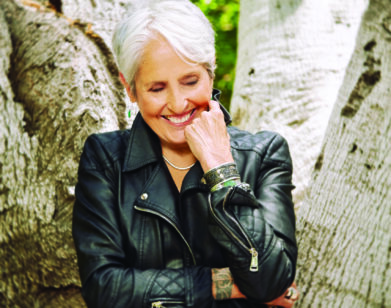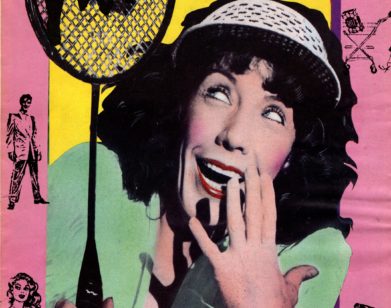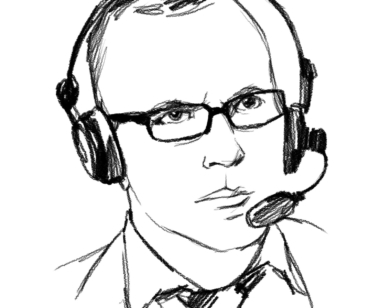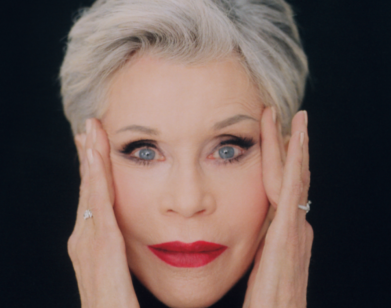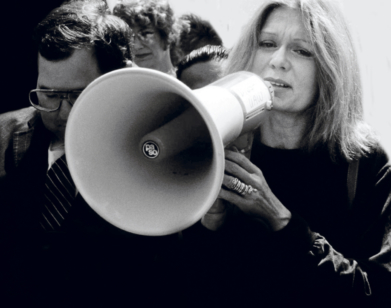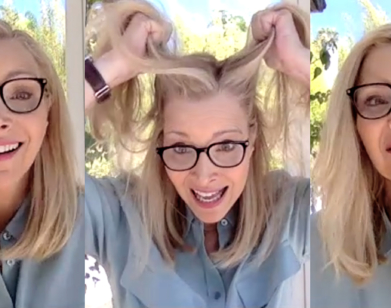Jane Fonda and June Diane Raphael Are Fighting for the Future
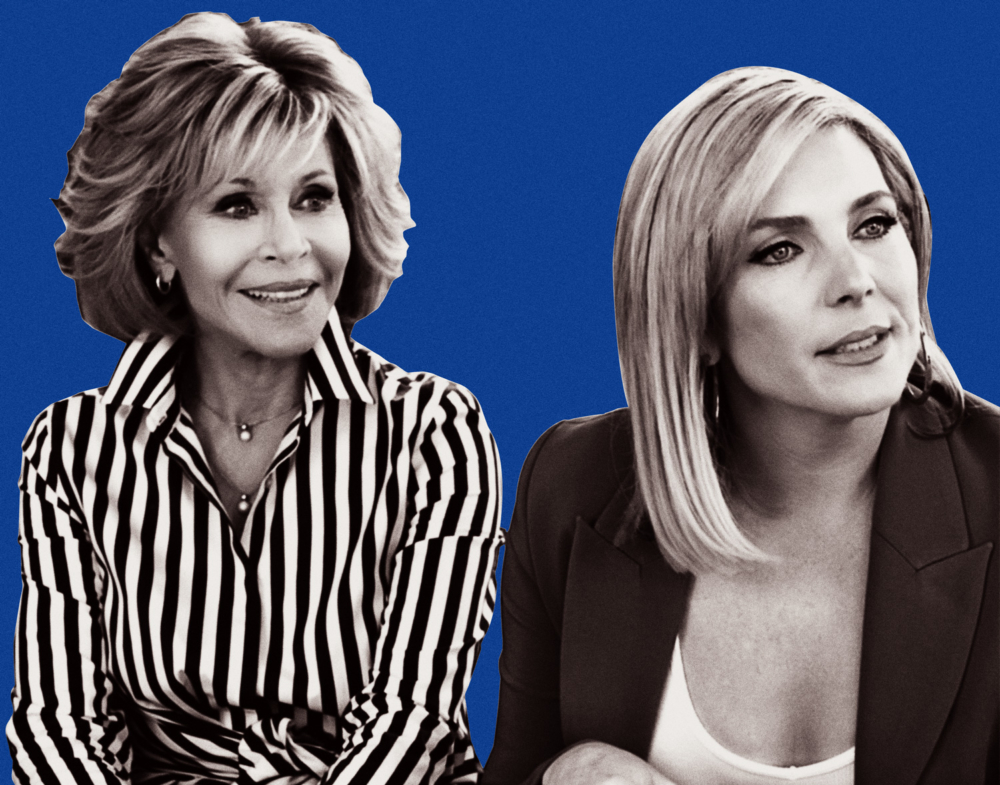
Courtesy Netflix. Art by Jack Vhay.
In the current era of at-home-everything, it’s the ripe time to appreciate the early genius of Jane Fonda, who pioneered the celebrity-led home workout with her aptly titled book-turned-ab-crunching video, Workout. But like everything Fonda does, Workout was beyond a mere exercise; she funneled the millions she made from the franchise into environmental advocacy efforts, an early example of the 82-year-old actor’s lifelong devotion to fighting climate change. With Firedrill Fridays, Fonda’s weekly (now virtual) protest initiative, she has joined the ranks of Greta Thunberg in taking to the streets for climate change—and ending up in jail, with her red coat and tongue out, no less. With the current Coronavirus crisis, Fonda is more concerned with using her platform to encourage people to call their Senators than to crunch a six-pack from their apartments, though she’s still working out with a trainer. (Six feet apart, of course.)
Since 2015, Fonda, along with Lily Tomlin, has brought her signature spark—a plop of elegance, a fizz of attitude—to small (and smaller) screens as one-half of Grace and Frankie, the titular octogenarian best-friend duo of Netflix’s hit series. Now mid-production of its seventh and final season, making it the streaming service’s longest-running show, Grace and Frankie has charmingly, if not radically, highlighted the trials and tribulations of women of a certain age—particularly a pair of bawdy, ballsy ones navigating life after their long-time husbands leave them for one another. While the forged bond of Tomlin’s New Age, caftan-draped sorcery and Fonda’s tight-lipped, martini-swaddling snark are the cornerstone of the series, a fan favorite has emerged in Fonda’s onscreen daughter, June Diane Raphael’s Brianna, whose boldness and business acumen rival those of her mother.
But it’s more than a mother-daughter bond and a shared razor-sharp sense of humor that Fonda and Raphael have in common. Like Fonda, Raphael has dedicated her off-screen life to political advocacy. Last year, she released a book, Represent: The Woman’s Guide to Running for Office and Changing the World, born of frustration with the current state of politics and its male-dominated makeup. She’s also the co-founder of The Jane Club, a Los Angeles-based workspace for women that offers childcare and support; in light of the Coronavirus, it’s now offering digital memberships. On an L.A. morning mid-quarantine, we hopped on a call with the pair to discuss activism, motherhood, and the advice they have for their characters. Fonda’s words of wisdom: “Don’t take advantage of shelter in place to get shit-faced.”
———
SARAH NECHAMKIN: Jane, you were ahead of the curve with the at-home workout routine. Who knew?
JANE FONDA: Well, I knew. But I didn’t think it was a pandemic that would keep people home.
NECHAMKIN: Is it true that June Diane didn’t make her bed during the Grace and Frankie virtual party?
JUNE DIANE RAPHAEL: Oh my gosh, Jane, you really outed me there.
FONDA: I did. My blogs are so damn serious. I actually did it on my Fire Drill Friday post on Friday. I talked about the Skype reunion, and I was happy to see your bed wasn’t made.
RAPHAEL: I just wanted to make everyone else feel more comfortable and keep it casual, make everyone else feel like they’re doing a great job.
FONDA: That’s right. That’s why I felt good.
RAPHAEL: I’ll tell you, I do not like cleaning.
FONDA: I don’t either.
RAPHAEL: I hope that once this is all over, that everybody gives their housekeeper and all domestic laborers a giant raise, because we’re really understanding the value of their work.
FONDA: Yeah. A guy I saw said he was having to hold school for the first time in his life, and after a few days, he thought that teachers should get the pay of CEOs. I thought that was pretty good.
RAPHAEL: Parenting, teaching, taking care of homes, taking care of children, taking care of elderly people. It is highly undervalued.
NECHAMKIN: What first motivated you both to get involved in activism?
FONDA: Oh, you really want me to go back to 1960? [Laughs] What about you, June?
RAPHAEL: I’ve definitely always been involved in whatever community I’ve been in, as has Jane, but since Trump’s election, it’s certainly become more a part of my daily life. The thing that I’ve been so inspired about Jane, working with her and watching her activism, is how willing she is to learn all the time. I feel like so many people will look at their lives and think, “Okay, I got it. Whatever education I’ve had up until now is great, and I will apply that in all things that I do.” Jane, your willingness to step into the vulnerability of not knowing and continuing to learn is truly inspiring. I think it’s the backbone of your activism, and it’s been something I’ve taken into my own life. Not just about the organizations, but also doing the internal work and investigation of thinking about the world and my place in it.
FONDA: Well, that’s so great of you to say. One thing that’s so vital to what’s happening right now is social media. This is the first time in human history that we’ve reached a global pandemic at a time when everyone on the planet can stay in touch immediately. Greenpeace has 54 Chapters in all parts of the world, and they can all be on Zoom at the same time. That’s quite extraordinary. It’s interesting to be living through something like this and watching how people respond so differently. When the Black Plague was over, feudalism died. So, the question is, how can we use this moment of pandemic to transform our economy in a way that takes care of people, workers, the families, the communities, instead of the already rich and the big corporations and the fossil fuel industry?
That’s the battle that we’re fighting right now, as this bailout package gets debated in the Senate. [Ed. Note: The Senate has now approved the bill.] The Trump administration has put forward a bailout package that doesn’t do much for people, but does a whole lot for multi-billion dollar corporations, and it’s a bailout to the fossil fuel industry. So, you’re using one existential crisis to reinforce another existential crisis. There’s a lot to be done, but we couldn’t do it this way without social media.
NECHAMKIN: Do you see the various work that you do in the public sphere as being inextricably linked?
RAPHAEL: The idea of vulnerability and open-heartedness and the willingness to jump to reflect directly ties into acting and being willing to jump into another person’s experience, and to think about what another person might want to be. I think they’re totally related, that intrigue about what it is to be someone else. It’s no surprise to me that so many actors are also activists, and are also deeply centered with the humane vision.
FONDA: Well, that’s understandable since our profession is the profession of empathy. Being in a hit series like Grace and Frankie sure helps on the frontline of activism. Don’t you think, June? People are much friendlier and more willing to listen and pay attention.
RAPHAEL: It’s an amazing tool, in that way. I also think that our series is, in its own, comforting, wonderful way, quietly moving the needle because it’s in a world where women really use their currency at their age. Especially at a time right now, where we’re asking people to fully consider an older population. I do think that Grace and Frankie has always been subversive in a way that is not necessarily recognized because it goes down so easily. You and Lily [Tomlin], we can all watch you read the phone book.
NECHAMKIN: Do you feel optimistic about the future ahead for women, for the climate, for the general population? Do you think it’s possible to find optimism right now?
RAPHAEL: Jane, please say that you feel hopeful. I can’t take any other answer.
FONDA: Yes, of course. I feel hopeful because there are so many people, young and old, that are really prepared to stand up and fight for what we need. And understand that all of these issues—the economy, workers’ rights, nurses’ rights, the environment, women’s rights—all these things are interconnected. There’s a consciousness that wasn’t there before. But we have to fight hard. We can’t just sit back. That’s why I’m so eager to encourage people to use this time at home, when we’re sheltering in place, to do activism. To write and call our elected officials. I’m sending out a post about how to find out about the military budget and where it needs to be cut, and how you can find out locally what to do with these types of things.
I’m also writing a book, so the shelter in place is fitting into my plan very well. It’s about Fire Drill Fridays. It’s called What Can I Do? My Path from Climate Despair to Action.
NECHAMKIN: Do you, as individuals, see yourselves as more of a Grace or a Frankie? Or a combination of the two?
FONDA: I think I’m a combo. I’m not as uptight as Grace. I’m not as conservative as Grace, and I’m not as crazy as Frankie. I have a lot of Frankie in me, and I’ve got a lot of Grace. What were you going to say, June?
RAPHAEL: I think a lot of why I understand Grace so much is your performance, and I love Grace because I feel like she’s always been doing the very best that she can do. I see both sides of you in both of them. I think, hopefully, I’m more of a Grace.
FONDA: How much like Brianna are you?
RAPHAEL: With the exception of certain things, I am very much a Brianna. [Laughs] I can connect to her boldness and her humor. I care what people think of me, though. But I do think it’s really important to see women behaving badly. I think so much of our lives, we’re given these small parameters which play into our behavior and discipline, and the world is watching closely. I think I behave a lot better, and I wish that I could be as bold in my own life.
FONDA: You’re pretty bold.
RAPHAEL: You think so? Thanks. I’m trying to be. I guess I’ve cared less and less.
FONDA: As we get older, we care less and less. There’s no question about that.
RAPHAEL: By the way, the times that we’re currently in right now, with Coronavirus, it’s interesting to spend so much time in the house and not fully care about how you look. That’s been fascinating. I value putting makeup on for a noon call.
FONDA: Listen, I posted a five-minute video online, and I scared myself. I looked so bad, but fuck it. I don’t care.
RAPHAEL: Yeah. I haven’t really been looking at the mirror now. I’m really curious how this will change me, because before I made sure I spent an inordinate about of time worried about how I looked, sort of disciplining my body. I hope I can take something from this.
NECHAMKIN: Do either of you have a favorite Lily Tomlin story?
FONDA: You remember the time, June, that it was just about all of us? We were on stage at one of those leading-up-to-the-Emmy things. And you were talking about how you hated to be thought of as a nice girl. Was that the word you used?
RAPHAEL: Yes, yes.
FONDA: She did this long riff about how the worst thing she can imagine is for someone to call her a nice girl. And then it came to Lillian, and someone asked about June, and Lily said, “Well she’s a nice girl.” And the way she did it absolutely brought the house down. It was just out of the blue. She’s just always got a way to be funny. That’s why I like hanging out with her, because I’m the opposite.
RAPHAEL: She’s so crude. She’s perfect. I’ve watched her exceptional performance like I do yours, Jane, because it is like a full body is listening. She’s listening so hard even when you think she’s not listening like that. Her toes are listening. Everything is awake and aware and ready to respond.
NECHAMKIN: What’s the best piece of advice you’ve ever gotten?
FONDA: Well, one piece of advice that has been important to me was never go into a business you don’t understand, which is what led to the workout business. And the other one is: No is a complete sentence. Unfortunately I didn’t hear that when I was an adolescent.
RAPHEL: Whoa, I like that. Jane, I’ve been reflecting on what you said about mothering and kids. You said how important it is to realize that what happens to them in these early developmental years will have such long-term effects and impact. And that you were happy that I was really understanding what it means to be a steward of their childhood. I take that very seriously.
NECHAMKIN: And what advice would you give to your characters on Grace and Frankie?
FONDA: Well, Grace would be sitting in her living room drinking Quarantinis and my advice to her is, don’t overdo it, Grace. Don’t take advantage of shelter in place to get shit-faced.
RAPHAEL: Oh, my god. Absolutely. My advice to Brianna, if I’m with Barry, is to just tell him he’s got to find another place to shelter in place. This will be the end of their relationship. The best thing I could do for the relationship is to ask him to leave and isolate elsewhere.
FONDA: I can see that. Yeah.
NECHAMKIN: Do either of you have any questions for each other that you haven’t had the chance to ask?
RAPHAEL: I’ve got about five million questions for you, Jane, but one that’s top of mind is, do you have any advice or thoughts on how to continue to love and honor one’s body as we age? Specifically for women?
FONDA: Well, number one, we have to accept the fact that as we age, gravity does its thing, and we shouldn’t worry so much about it. The most important thing is staying healthy and keep moving. What I do now is completely different than what I used to do. In fact, I’m about to be late with a trainer who stays six feet away—she wears a mask and I wear gloves and we wash everything down. But I do these exercises and I imagine that 30-40 years ago, I would’ve thought it was completely wimpish. Don’t try to do what you used to do, but do something. Keep moving. And as long as your body is healthy, you’ve got to take that and stop worrying so much about it.
RAPHAEL: Love that. Do something. I’m going to take that right now. I told Jane I’m going to put on the Corona 15.
FONDA: Just do something. Yeah. I work out everyday.
NECHAMKIN: How do you make time when you’re on set? Or when you’re getting arrested?
FONDA: You can do wall squats in prison.

